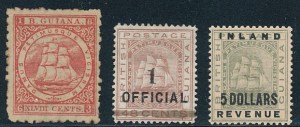The unions of the United States Postal Service have signed a new contract and it appears that there is no danger of a postal strike. Labor peace is a part of today's economic climate in a way that one, growing up in the 1960s, never would have thought. Strikes were common in many industries then and the Postal Service even went out on strike a couple of times. And postal strikes were dangerous economic events for businesses like professional philatelists. Back then, auction catalogs were mailed and bids for the auction were mailed in as well so that a disruption of the postal service essentially meant the closure of all mail order businesses. Labor peace is ubiquitous throughout US industry and the reason is the same no matter what the industry. Competition has paralyzed workers and made them much meeker in their salary and benefit demands. Virtually every manufacturing company still left in America has competitors abroad and any work stoppage would mean lost market share that might be
Monthly Archives: April 2011
- Posted April 04, 2011Read more »
- Posted April 01, 2011Read more »

The greatest impediment to a smaller country's philatelic popularity is rarities. Collectors, when they move outside the philately of their home country, want attractive stamps and they want a collection that is completable for a reasonable expenditure of time and money. British Guiana has always had this philatelic cross to bear. The stamps are interesting, well designed and hard to find. But the rarest stamp in the world, the one cent magenta, is from British Guiana as are the Cotton Reels and the first page in the British Guiana specialty album would cost you about $2 million to complete- even if you could get the British Guiana out of the estate of John DuPont, who died in prison recently after murdering a wrestler on his property in 1997. British Guiana was originally settled by the Dutch and would be included in the philately of Netherlands Antilles if the Dutch hadn't ceded sovereignty to the British during the Napoleonic wars. For years, British Guiana was in essence a huge sugar
